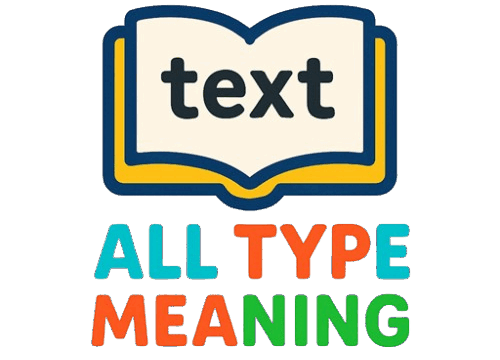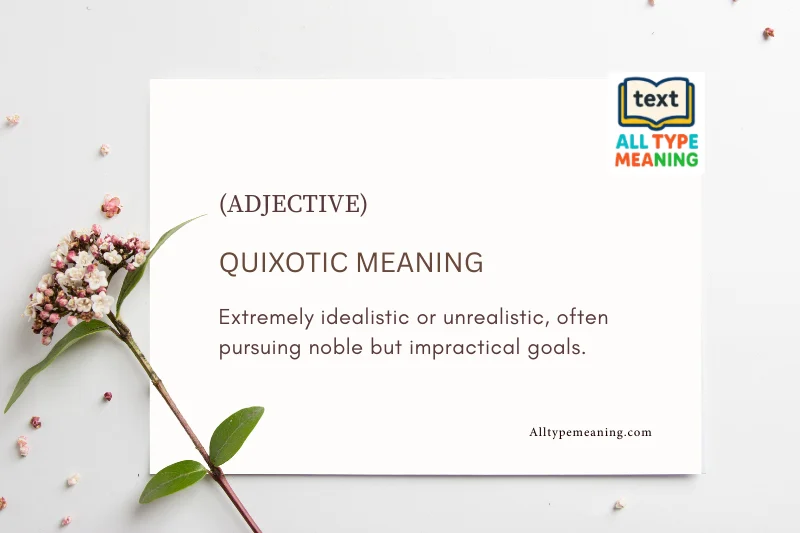Quixotic meaning refers to ideas or actions that are extremely idealistic, unrealistic, or impractical—like chasing dreams that seem almost impossible. The word comes from the famous literary character Don Quixote, who pursued noble but impractical adventures. Understanding quixotic is more than just a vocabulary lesson; it helps us describe dreams, ambitions, or plans that are charming yet unlikely to succeed.
Students can use it to enrich essays, professionals can describe ambitious projects, and language learners can add flair to their conversations. By exploring the complete meaning, examples, and usage, you’ll not only grasp the word but also appreciate how it captures the beauty of bold, imaginative thinking.
What Does Quixotic Meaning? The Basic Definition
To define quixotic meaning, we need to understand that it describes someone or something that is idealistic but unrealistic or impractical. When we say someone is being quixotic, we mean they’re pursuing noble goals or dreams that are probably impossible to achieve in the real world.
The quixotic definition encompasses several related meanings:
- Idealistic in an unrealistic way 💭
- Having noble but impractical goals 🏰
- Pursuing romantic notions that ignore practical realities 🌹
- Being overly optimistic about challenging situations ☀️
Think of it this way: a quixotic person is like someone who dreams of building a castle in the clouds – it’s a beautiful idea, but it’s not very practical! The word carries both admiration for the person’s noble intentions and gentle criticism of their lack of realism.
Quixotically: The Adverb Form
When someone acts quixotically, they’re behaving in a quixotic manner. For example: “He quixotically believed he could single-handedly solve world hunger with his small charity organization.” 🌍
The Fascinating Origin Story Behind “Quixotic”
Understanding the quixotic meaning becomes much clearer when we explore its origins. The word comes from the legendary character Don Quixote, created by Spanish author Miguel de Cervantes in his famous 1605 novel “Don Quixote de La Mancha.”
Don Quixote was a middle-aged gentleman who became so obsessed with chivalric romances that he decided to become a knight-errant himself. He would:
- Fight windmills believing they were giants 🌪️
- See ordinary inns as magnificent castles 🏰
- Treat a simple peasant girl as a noble lady 👸
- Embark on adventures to right the wrongs of the world ⚔️
His noble intentions were admirable, but his actions were completely disconnected from reality. This is exactly what we mean when we describe something as quixotic today!
The character became so iconic that his name transformed into an adjective that perfectly captures the essence of idealistic impracticality. It’s amazing how one literary character gave birth to a word that’s still widely used over 400 years later! 🎪
How to Use “Quixotic” in Everyday Language
Now that you understand the quixotic definition, let’s explore how to use this word effectively in different contexts. The beauty of “quixotic” lies in its versatility – it can be applied to various situations while maintaining its core meaning.
In Academic and Professional Settings
- “The startup’s quixotic mission to provide free internet to every village in the world attracted both investors and skeptics.”
- “Her quixotic attempt to reform the entire education system single-handedly was admirable but unrealistic.”
- “The politician’s quixotic campaign promises included eliminating poverty within one year.” 🗳️
In Personal and Social Contexts
- “My friend’s quixotic plan to hitchhike across the country with just $50 worried all of us.”
- “It was quixotic of him to think he could win her heart with just a handwritten poem.” 💕
- “Their quixotic dream of buying a mansion on a minimum-wage salary was touching but impractical.”
In Literature and Art Discussions
- “The protagonist’s quixotic quest for perfect justice drives the entire narrative.”
- “The artist’s quixotic vision of creating a masterpiece using only recycled materials challenged conventional thinking.”
- “Many romantic poets had quixotic ideals about transforming society through their verses.” 📝
Remember, when you define quixotic in your own words, emphasize both the nobility of the intention and the impracticality of the approach. This dual nature is what makes the word so rich and meaningful! ✨
Common Examples and Scenarios Where “Quixotic” Applies
Understanding the quixotic meaning through real-world examples helps solidify your grasp of this fascinating word. Let’s explore various scenarios where “quixotic” perfectly captures the situation:
Environmental and Social Causes
Many environmental activists might be called quixotic when they:
-
- Believe they can stop climate change through individual recycling efforts alone
- Think they can convince entire corporations to change their practices with a single petition
- Dream of creating a completely waste-free society overnight 🌍
While their intentions are noble and necessary, the approach might be considered quixotic due to the scale and complexity of these challenges.
Business and Entrepreneurship
In the business world, quixotic ventures often include:
-
- Startups that aim to replace all traditional banks with blockchain technology immediately
- Entrepreneurs who believe they can capture 90% of a market with no experience or funding
- Companies that promise to solve complex problems with overly simple solutions 📊
Personal Relationships and Dreams
Personal quixotic behaviors might involve:
-
- Believing you can change someone’s fundamental personality through love alone
- Planning to become a Hollywood star without any acting experience or connections
- Thinking you can master a complex skill like playing piano professionally in just a few months 🎹
Academic and Educational Pursuits
Students and educators sometimes display quixotic tendencies by:
-
- Trying to read every book ever written on a subject in one semester
- Believing they can revolutionize education with a single innovative teaching method
- Attempting to solve century-old mathematical problems as undergraduate projects 🔢
The key to using “quixotic” correctly is recognizing situations where good intentions meet unrealistic expectations. It’s not about mocking people’s dreams – it’s about acknowledging the gap between noble aspirations and practical reality! 🎯
Synonyms, Antonyms, and Related Words
To fully grasp the Quixotic Meaning, it’s helpful to explore similar words, opposites, and related terms. This makes it easier to use the word accurately in different contexts, whether in writing, speech, or academic work.
Words Similar to Quixotic
Idealistic: Focuses on pursuing high principles, but doesn’t necessarily imply impracticality
- Example: “Her idealistic vision of world peace inspired many followers.”
Unrealistic: Emphasizes the impractical nature but may lack the noble intention aspect
- Example: “His unrealistic expectations led to disappointment.”
Romantic: Suggests idealized, often impractical notions, especially about love or adventure
- Example: “She had romantic ideas about living in a cottage by the sea.” 🏖️
Visionary: Can be positive (forward-thinking) or negative (impractical), depending on context
- Example: “The visionary architect designed buildings that seemed impossible to construct.”
Utopian: Describes perfect but unrealistic social or political ideals
- Example: “The commune was based on utopian principles that ignored human nature.” 🏘️
Words Opposite to Quixotic
Pragmatic: Focused on practical, realistic approaches to problems
- Example: “Her pragmatic solution addressed immediate needs rather than perfect ideals.”
Realistic: Acknowledging and dealing with situations as they actually are
- Example: “He took a realistic view of his chances for promotion.” 📈
Practical: Emphasizing usefulness and efficiency over theoretical ideals
- Example: “The practical design prioritized functionality over aesthetics.”
Cynical: Skeptical about noble motives and idealistic goals
- Example: “His cynical attitude dismissed all charitable efforts as publicity stunts.”
Understanding these nuances helps you appreciate why “quixotic” is such a perfect word – it captures something that purely positive words like “idealistic” or purely negative words like “unrealistic” cannot express alone! 🎭
When someone acts quixotically, they embody this beautiful contradiction between admirable goals and questionable methods. This is what makes the quixotic meaning so rich and applicable to countless human situations! ✨
Conclusion:
The term quixotic meaning wonderfully encapsulates the fine line between lofty aspirations and unrealistic actions. Grasping its significance enables us to articulate grand dreams, daring endeavors, and creative concepts that might appear impractical yet evoke admiration.
From the realms of literature and art to personal ambitions and career goals, identifying quixotic behavior allows us to value creativity, enthusiasm, and vision—even when practicality is lacking. By mastering the correct usage of this term, students, professionals, and language lovers can enhance their vocabulary, convey subtle ideas, and appreciate the allure of bold, idealistic thinking in daily life. For more fascinating word insights, check out our article on Mellifluous Meaning to explore another unique and beautiful term.
Frequently Asked Questions
1. Is calling someone “quixotic” an insult or a compliment? 🤷♀️
Answer: It’s neither purely an insult nor a compliment – it’s a nuanced observation! When you define quixotic behavior, you’re acknowledging both the nobility of someone’s intentions and the impracticality of their approach. It’s often said with a mixture of admiration and gentle criticism. The context and tone matter greatly in determining how it’s received.
2. Can “quixotic” be used to describe objects or ideas, not just people? 💭
Answer: Absolutely! While the quixotic definition often applies to people’s behavior, you can describe plans, ideas, projects, or even artistic works as quixotic. For example: “The quixotic architecture of the building ignored all practical considerations for the sake of artistic vision.” 🏗️
3. What’s the difference between “quixotic” and “idealistic”? 🔍
Answer: While both words describe pursuing high ideals, “quixotic” specifically implies that these ideals are unrealistic or impractical. “Idealistic” can be purely positive, suggesting someone with high principles. Quixotic meaning always includes the element of impracticality that “idealistic” may lack.
4. How do you pronounce “quixotic” and “quixotically”? 🗣️
Answer: “Quixotic” is pronounced “kwik-SOT-ik” (with emphasis on the middle syllable). Quixotically is pronounced “kwik-SOT-ik-lee.” The “x” makes a “ks” sound, which can be tricky for English learners! 🎵
5. Are there any positive contexts where being quixotic is celebrated? 🌟
Answer: Yes! In literature, arts, and social movements, quixotic characters and leaders are often celebrated for their unwavering commitment to their ideals, even when facing impossible odds. Many great historical changes began with someone’s “quixotic” dream. The key is that while we admire the spirit, we also recognize the practical challenges! 🚀

